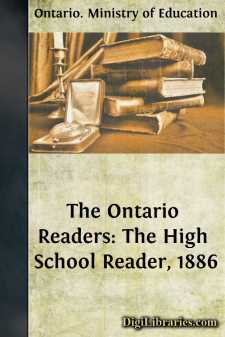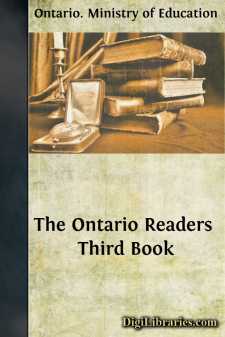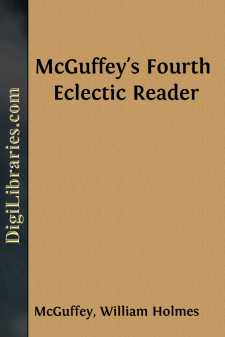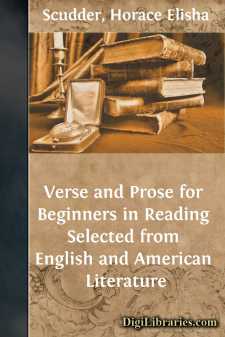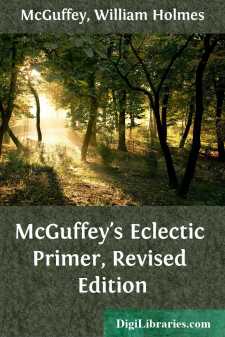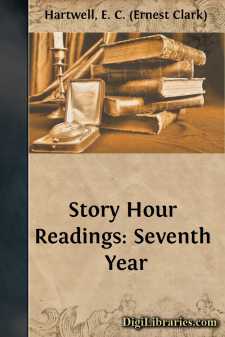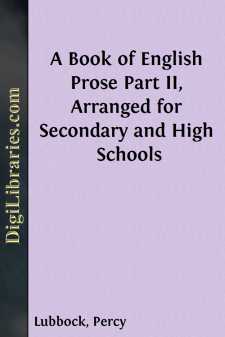Juvenile Nonfiction
- Animals 10
- Art 1
- Biography & Autobiography 2
- Boys & Men 1
- Business & Economics 3
- Cooking & Food 2
- Gardening 1
- General 32
- Girls & Women 7
- History 2
- Holidays & Celebrations 1
- Lifestyles 79
- Literary Criticism & Collections 5
- Nature 11
- Readers
- Religion 4
- Sports & Recreation 1
Readers Books
Sort by:
PREFACE. The selections in the High School Reader have been chosen with the belief that to pupils of such advancement as is required for entrance into High Schools and Collegiate Institutes, oral reading should be taught from the best literature, inasmuch as it not only affords a wide range of thought and sentiment, but it also demands for its appropriate vocal interpretation such powers of sympathy...
more...
FORTUNE AND THE BEGGAR One day a ragged beggar was creeping along from house to house. He carried an old wallet in his hand, and was asking at every door for a few cents to buy something to eat. As he was grumbling at his lot, he kept wondering why it was that folks who had so much money were never satisfied but were always wanting more. "Here," said he, "is the master of this house—I...
more...
ECLECTIC EDUCATIONAL SERIES. MCGUFFEY'S (Registered)FOURTH ECLECTIC READER. REVISED EDITION. McGuffey Edition and Colophon are Trademarks of John Wiley & Sons, Inc. New York-Chichester-Weinheim-Brisbane-Toronto In revising the FOURTH READER, the aim has been—as it has with the other books of the Series—to preserve unimpaired all the essential characteristics of MCGUFFEY'S READERS. New...
more...
VERSE AND PROSE FOR BEGINNERS IN READING. ALPHABET. A was an apple-pie;B bit it;C cut it;D dealt it;E ate it;F fought for it;G got it;H had it;J joined it;K kept it;L longed for it:M mourned for it;N nodded at it;O opened it;P peeped into it;Q quartered it;R ran for it;S stole it;T took it;V viewed it;W wanted it;X, Y, Z, and amperse-and,All wished for a piece in hand. A DEWDROP. Little drop of...
more...
LESSON XXVII. look go John here all wheel mill have round oo j Look! there are John and Sue by the mill pond. They like to see the big wheel go round. They have come to play on the logs and in the boat. John and Sue will play here all day. [Illustration: Script Exercise: The cows like grass. They stand in the shade. ] or Jane girls floor roll some which black o Here are some girls with skates; but they...
more...
PHILEMON AND BAUCIS I Long ago, on a high hill in Greece, Philemon and Baucis lived. They were poor, but they were never unhappy. They had many hives of bees from which they got honey, and many vines from which they gathered grapes. One old cow gave them all the milk that they could use, and they had a little field in which grain was raised. The old couple had as much as they needed, and were always...
more...
PREFACE This reader undertakes to provide desirable material for work in silent reading without losing sight of the other elements essential in a good reader for pupils in the seventh grade or in the first year of the junior high school. One task before the teacher of Reading in this year is to foster, by stimulating material, a taste for good reading which it is to be hoped has at least been partially...
more...
ARITHMETIK UND ALGEBRA. Study carefully the notes (beginning page 97) to which the small numbers in the text refer. Arithmetik ist ein Fremdwort, das auf deutsch Zahlenlehre bedeutet. 1 + 2 = 3 wird gelesen: eins und zwei (oder eins plus zwei) ist drei. 25 - 13 = 12 wird gelesen: 25 weniger (oder minus) 13 ist 12. 2 × 3 = 6 wird gelesen: 2 mal 3 ist 6. 72 ÷ 6 = 12 wird gelesen: 72...
more...
by:
James Baldwin
The Home Coming Tom was to arrive early in the afternoon, and there was another fluttering heart besides Maggie's when it was late enough for the sound of the gig wheels to be expected. For if Mrs. Tulliver had a strong feeling, it was fondness for her boy. At last the sound came—that quick light bowling of the gig wheels. "There he is, my sweet lad!" Mrs. Tulliver stood with her arms...
more...
by:
Percy Lubbock
SIR THOMAS MALORY 15th century DEATH OF SIR GAWAINE And so, as Sir Mordred was at Dover with his host, there came King Arthur with a great navy of ships, galleys, and carracks. And there was Sir Mordred ready waiting upon his landing, to let his own father to land upon the land that he was king of. Then was there launching of great boats and small, and all were full of noble men of arms; and there was...
more...


